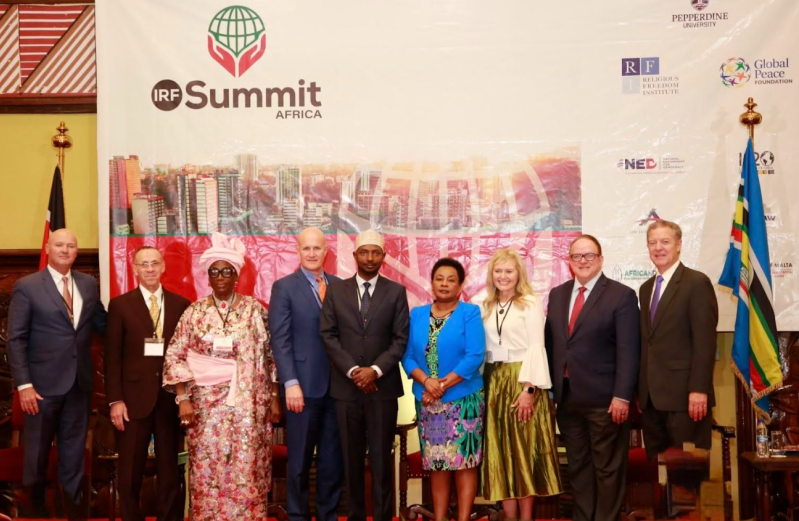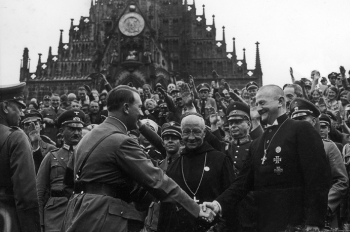
Kenya hosted the first-ever International Religious Freedom Summit in Africa with delegates from across the globe convening in Nairobi mid-June to deliberate on the theme, "Africa Together: A Continental Call to Religious Call to Religious Freedom."
The gathering brought together a diverse coalition of global and regional experts, dignitaries, chief justices, faith leaders, and civil society stakeholders and was co-convened by Pepperdine University, the Religious Freedom Institute (RFI) and the Global Peace Foundation (GPF).
The summit aimed to galvanize the movement for greater freedom of religion or belief (FoRB) in a continent with the world's fastest-growing population, which has also experienced a significant rise in religiously motivated acts of terror.
"This Summit marks a defining moment for Africa," said H.E. Bola Obasanjo, Co-Chair of IRF Summit Africa ad a former First Lady of Nigeria. "I am proud to lead this continental effort to champion the sacred right of religious freedom, a right that protects our diversity, stregthens our unity and uplifts the soul of our nations. Africa has long drawn strength from its deep faith and resilient spirit."
Her homeland has been the epicentre of religious persecution over the last decade. According to Open Doors International's 2025 World Watch List, 3,100 Christians were killed and 2,830 kidnapped in Nigeria alone in 2024, with Rwanda experiencing 4,000 closures of Christian churches due to state regulations on unregistered and non-compliant churches.
The Director of Open Doors Italy lamented, "In 32 years of research, we recorded a steady increase in anti-Christian persecution in absolute terms. 2024 is again a record year of intolerance: 1 in 7 Christians suffer discrimination or persecution because of their faith: It is crucial to get back to talking about religious freedom in the public debate."
A June 2023 report from Aid to the Church in Need (ACN) identified 13 African countries among the 28 where Christians face the most severe persecution globally, including the Democratic Republic of Congo, Nigeria, Mali and Sudan.
While the situation in parts of Africa can be described as "dire," there is also "cause for hope," as noted by Ambassador Sam Brownback, IRF Summit Co-Chair and former U.S. Ambassador at Large for International Religious Freedom. He expressed belief that the summit would be "a turning point for bringing together a diverse coalition that can truly advance this fundamental human right across Africa."
Jim Gash, President of Pepperdine University, stated that "Religious freedom is a cornerstone of human dignity and a pillar of Pepperdine University’s mission. We are proud to stand with leaders across Africa and the global community to advance this essential right." Similarly, RFI President David Trimble noted that the summit would "provide the groundwork" for the concerted effort needed to confront "the enormous threats to people of faith in Africa."
A series of engaging panels and conversations formed the core of the summit's programming. A session titled, "Religious Freedom and State Regulation: Emerging Challenges in Africa," delved into the trend of African countries passing legislation to regulate religious organizations and practitioners, examining their pros and cons and their impact on the internationally recognized right to religious freedom, while also discussing alternative solutions focusing on self-regulation.
Central to many discussions was the profound influence of African values. The panel, "African Values & Religious Freedom – Advancing Religious Freedom in Africa," specifically explored the significant role of the communal ethic of Ubuntu, which means "I am because we are." This value resonated throughout the day's dialogue as a cultural foundation for coexistence and religious freedom. Delegates engaged in critical conversations about how African values could guide justice and governance reforms, enhance multifaith collaboration, and serve as a catalyst for religious freedom.
The session, "Faith Leaders as Ethical Innovators: Advancing Religious Freedom as a Catalyst for African Renaissance," highlighted how religious leadership, rooted in both spiritual conviction and African traditions of collective responsibility, serves as a driving force for social cohesion. This panel explored practical strategies through which faith leaders can champion religious freedom, foster interfaith collaboration, promote governance grounded in integrity and inclusivity, and drive systemic change, including developing interfaith networks, implementing empowerment programs for youth, and utilizing digital platforms for advocacy and education.
Honorable Lady Justice Philomena Mbete Mwilu, Deputy Chief Justice of the Republic of Kenya, opened the main session with a call for justice "rooted in the Kenyan Constitution and African moral traditions." The human impact of religious persecution was brought to the forefront through powerful survivor testimonies. Individuals who had endured persecution simply for their faith shared firsthand accounts of detention, discrimination, and exile.
Among them was Mubarak Bala, a Nigerian who suffered years of imprisonment for blasphemy. These deeply personal stories served as "both a sobering reminder and a moral call to action," conveying a clear message: "Religious freedom is a moral imperative and a fundamental right for everyone, everywhere, and at all times."
The engagement of judicial figures was a defining feature, with the session, "Exploring Effective Judicial Innovations in Religious Freedom Conflicts," bringing together chief justices and other justice leaders from across the continent. This cross-cultural exchange aimed to enhance regional cooperation and promote the development of alternative dispute resolution models tailored to Africa’s diverse religious and cultural contexts. The involvement of such prominent judicial figures was seen as providing "long-term credibility and institutional ownership" to the initiative, laying a foundation for ongoing engagement beyond the forum and inspiring "innovative, rights-based solutions that balance religious freedom with national unity and the rule of law."
Despite peaceful youth-led protests occurring in Nairobi on the morning of the Summit, causing initial concerns about safety and mobility, the "overcapacity crowd" at the Safari Park Hotel sent an unmistakable message: "the commitment to religious freedom is both urgent and unwavering."
Dr. Paul Murray, International Vice President for Religious Freedom Initiatives at the Global Peace Foundation, summarized the event's profound significance, declaring, "This Summit is not just a gathering; it is a continental call to action."





